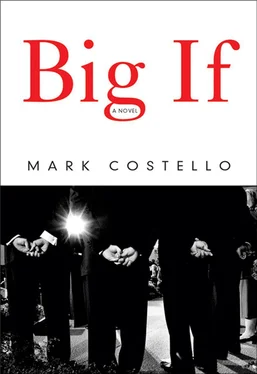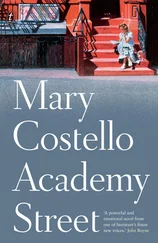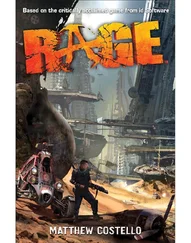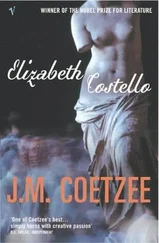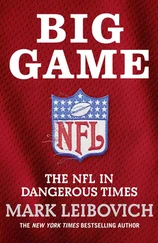The file room had steel walls, deep shelves, and stacked boxes. Boone ran a hand along the boxes. “These here are the closed threat investigation binders going back several budgets. I’d say there’s fifty feet of threats and follow-up back here. More recent stuff, the working files, is parceled out to my guys. We’d have to go cubicle by cubicle. I’ve got a master printout in my desk, but it’ll just have the basic information.”
He disappeared down an aisle, returning with a box. The box was filled with books like photo albums. He was looking at the spines. “This is Arabs. This is neo-Nazis. This is white supremacists and a few tax protesters. This is the militias and the violent splinter right-to-lifers. This is schizophrenics. This is miscellaneous. It’s not the perfect system, because, for example, most neo-Nazis are also white supremacists — it’s a question of emphasis — but I guess it’s better than no system.”
He picked a book from the stack. The book thumped on the tabletop.
“This goes back to July,” he said. “Spring is down the hall. I can get it for you, if you want.”
Vi sat at the table in the corner and started going through the book, turning the heavy album pages, picture after picture, summer crowds in shirtsleeves, crowds and smaller groups, twos and threes. She saw two men in a pickup. The driver had sideburns and a hairy forearm. The passenger was in the shadow of the cab.
“Those two,” said Christopher, looking over Vi’s shoulder. “They kept hanging around the courthouse up in Concord. One of them we traced back to the tax protesters, or maybe the car. I think we traced the car. We have a file on that car somewhere. They saw us taking pictures and never showed again.”
Tashmo asked for the little agents’ room. Christopher handed him a key tied to a ruler.
Vi saw a man in a bathrobe taking out the trash, a man and a woman crossing a street, two men at a pay phone, one man pumping gas as another walked away. The weather got colder as Vi turned the pages. The people wore shorts and shirtsleeves, then jackets and pullovers, then coats and hats and boots. Vi saw a man scraping ice from a windshield, two men outside a Dairy Queen, two men and three women standing by a park bench on the fringe of some protest. Vi looked through seven books in all.
“I don’t know,” she said, closing the last book. “Maybe she’s in there. I didn’t really see her face.”
“No,” said Boone, “you never do. Drives me nuts, personally. You never know until later that this face — in a wall of faces, this face — will turn out to be significant. Not that your screamer will turn out to be significant, because, I mean, chances are, statistically, she won’t. But you can’t know this until later and now you’re kicking yourself for not knowing at the time that she might turn out to be important.”
Christopher came back with a large manila interoffice envelope. “These are loose,” he said. “We’ll file them when everything dies down.”
Vi started through the color photos in the envelope. Outdoor protests, placards and human chains, riot cops in helmets, people kneeling. Vi pointed at an old man with white hair, his face half obscured by someone else’s blurry hand. The picture was stamped SP-Harrisburg .
Vi said, “I’ve seen that guy somewhere before.”
Boone said, “Are you sure?”
“Definitely yes.”
Boone looked at the picture. “Oh, him. He’s in the other books.”
Another picture: a woman, a brunette, and a young man with a boot-camp haircut getting into or out of a green car, something with a hatchback, a Pinto or a Mazda.
“No,” said Vi.
Another picture: another protest, wintertime. Vi saw the same brunette, now in sunglasses, a scarf over her head, with another woman, also in a scarf. The women were walking up a street. The picture was taken from a car; Vi could see the doorframe in the corner of the shot. The first woman, the older of the two, carried a cardboard mailing tube. The picture was stamped Erie PD.
Vi said, “Maybe.”
Christopher said, “Which?”
“Her,” said Vi, pointing to the younger woman, the one without the mailing tube.
“We could do a flyer,” Boone was musing. “We could do a sketch, pass it out to the cops, in case she tries to crash your perimeter again. That’s worked in the past. We’ve got a super artist on retainer. He does wild seascapes and all of the official gubernatorial portraits — you should see him work. Holds the pencil like this, eraser like this, and his hands are like a blur, incredible. I think he’s on vacation, but I have his beeper. We could do it over the phone. He could fax the sketch back to us for corrections. His name is Ed Talty, and I like to kid him. I say, ‘Ed, where in the hell—’”
Vi pointed to her maybe, the woman in the picture. “What’s her name, Boone?”
Boone looked the women in the picture, the face just out of focus, frozen in the frame. “I don’t know,” he said, “but I know someone who might.”
“The informant’s name isLittle Flower,” Boone was saying. “Or that’s her movement name. She has a real legal name, of course, but we don’t use it, do we, Christopher? She’s been working for us since the fall — we got her from the FBI in a multiplayer trade — and if you call her anything but Little Flower she gets all bent out of shape and it takes an hour to get her back on topic. So that’s the first thing to remember when we get there, Vi: call her Little Flower. It’ll save a major hassle.”
Vi said, “What’s her deal?”
Boone said, “She bombs things.”
They were following the motorcade away from Severance, east on a state highway through the low, eroded hills.
“She started as a biker chick,” Boone said. “She was with a gang up north, some lame Hell’s Angels spin-off. They roared around the timber towns, sold guns and fake ID, smuggled speed from Montreal. Little Flower’s specialty was rental cars. You steal a credit card, run up some ID to match the name, rent a car from Avis, chop it up for parts, not a bad racket all in all. The Bureau popped her at Logan with a stack of Vermont driver’s licenses, her picture with ten different names. They sent her to Memphis for that. She met some Christians in the bing. They recruited her, converted her, whatever. She came out loving Jesus and reporting to Probation. Last winter — I don’t know, you maybe saw the press — her group blew up the Whole Woman Wellness Center down in Erie, Pennsylvania, with a two-ton fertilizer bomb. The cops found Little Flower sleeping in a rest stop on the Pennsylvania Turnpike. The van was stolen, she was wanted by Probation, and the van seats tested positive for nitrates. The Bureau tried to flip her on the clinic. She said no, I’ll never talk, this is my religion now, blah blah blah blah blah, so the Bureau went to work on her. They showed her pictures of the watchman in the rubble. She said it was a big mistake, there wasn’t supposed to be a watchman, that’s why they blew it up at night. The Bureau said, ‘There’s always a night watchman, Little Flower.’ They showed her pictures of the man, his family, his wife of forty years, his eleven grandkids, his ribbons from Korea, and his bowling trophies. They said, ‘This was a life. You took a human life.’ They kept it nice and simple. I’m told she fell apart and started giving names and that’s how she became a confidential source. She’s still pretty touchy about the night watchman. Don’t ask about Whole Woman, don’t mention bowling trophies. She gets all worked up and then you have to calm her down again.”
They stopped for gas at a two-pump country store in a town called Willingboro. Christopher did the pumping. Vi and Boone stayed in the car. Vi watched the motorcade get smaller down the road.
Читать дальше
